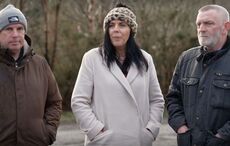John Boyne is one of Ireland's best selling authors, but until now he's never set a novel in Ireland. With A History of Loneliness, the acclaimed Dublin-born author tackles the abuse crisis in the Catholic Church from within the institution itself. Cahir O'Doherty talks to him about his new work.
When John Boyne was 13, one of his old school teachers in Terenure College in Dublin used to keep a wooden stick up his sleeve that he called Excalibur. Already a fearsome looking thing, he improved it by taping a metal weight to the top to maximize the injuries to the boys.
One day, for a laugh, Boyne passed the stick down the class. He was spotted. For his impertinence he was beaten so severely by the teacher (Father Patrick Grace, now deceased) that he took two weeks off school to recover from it.
Boyne is a grown man of 45 now, and although these days he's one of Ireland's most acclaimed and best-selling authors, to date he has never written directly about the land he grew up in (and where he still lives). Given the kind of experiences he had in his youth this might not be so surprising, since it can take years and even a lifetime to make sense of the legacy of so much pointless human misery.
“It was a culture of beatings and violence,” Boyne tells the Irish Voice. “It didn't take anything to trigger the teachers. They were tortured souls. Angry, bitter men who looked at the 30 teenage boys every day who had independent minds and their whole lives in front of them and felt nothing but resentment towards them. They wanted to hurt them because of that.”
What was it like when these tortured men were children? What did they go through in their own schools? Why did they choose to become priests at the age of 17, Boyne asked himself.
“What 17-year-old decides to do that?” he asked. Ultimately his question led him to tackle a subject that in itself has become nothing less than a turning point in Irish history.
In A History of Loneliness, Boyne introduces us to Father Odran Yates, a priest who has served as a chaplain of a boys’ school for almost 30 years.
Over the decades Yates stays silent even when it becomes clear to him that he should have spoken up. He looks the other way as his superiors shuffle troublesome priests from parish to parish, putting the reputation of the institution before every other consideration.
In the book Boyne reminds us how priests were treated like rock stars by the reverential Irish public. Then he shows us how much times have changed now, with the elderly Yates, who grown wary of stepping outside, where the public attitudes have shifted from deferential to hostile.
“I haven't written about Ireland before because I was waiting for a story that I really wanted to tell,” Boyne says. “I was surprised by the way Irish fiction hasn't explored this subject. It's been the big story of the last decade and yet most of my friends who are novelists were all writing about the recession and the banks.”
Why was nobody writing about the abuse crisis, he wondered. “At the opening of the book there's a scene where Father Yates witnesses a priest weeping face down in a grotto. That scene actually happened. My father told me that story, he witnessed it himself,” Boyne recalled.
“It sent a chill through me when I heard about it and it just triggered something in me. In the book we never really know who this priest is or what happens there, but it becomes the starting point of this subject.”
What gets overlooked in the middle of a typical Irish day can be astonishing, in other words. An Irish grotto was also famously the scene where real life teenager Ann Lovett gave birth alone and uncomforted in January 1984, a year after the abortion referendum that was supposed to prevent such tragedies from occurring. Boyne's book is about how much people are willing to overlook if their own futures are affected.
“It really did bring up some old stuff for me,” he confesses. “Because I've been writing for so long and because I haven't written about Ireland, once I did start writing it a flood of memories came out -- sites, sounds, smells, places. I was an alter boy myself and the sense of what that was like, the sense of authority that you had even as a child, came back.”
The fear came back too, he says. “I used to dread ringing the bell at the wrong time. I would be in an absolute state of panic over things like that.”
Once he started uncovering his memories and writing them down, Boyne had his first Irish novel.
“The emotion came back too. I started feeling angry about school, about teachers I had. It's definitely the most personal thing I've written for sure,” he says.
“I didn't know when I started writing it that so much personal material would find its way into the story. So many stories that are in the book are true.”
Yates's voice was difficult to capture at the start, he adds. “I started out with the idea that Father Yates was going to be a really decent, good guy. But as it developed I realized that he's complicit in many of the things that take place.
“He turns a blind eye to them. I wanted the reader to sympathize with him but not be really sure by the end if he was a good guy or a bad guy.”
Boyne doesn't make it easy on his characters or the reader. His Father Yates is content in his vocation, and on the surface he appears to be doing his best in his life and ministry.
“He's not consumed with bitterness or anger, but he may not be as good as he thinks he is,” Boyne offers. “He's happy hiding away in Terenure College. But he's not out there in the community, he's hiding away with his books and his teaching.”
Heading out into the wider world is a prospect that becomes increasingly unwelcome as the book progresses, we learn.
Considering how controversial the topic is, was Boyne hesitant to address it?
“I wasn't hesitant at all. Yes, it's a controversial subject but that's good. I went through many years of feeling great antipathy and vitriol towards the church, and what I didn't want to do was turn A History of Loneliness into a big diatribe. That's kind of boring and obvious.”
Instead, through the book’s even-handed approach, Boyne wants the forces who ceaselessly defend the church to consider what it might be responsible for, he says. He also wanted those who condemn it to remember the good it has done.
“There have been decent men and decent women who have devoted their lives to the church, who have done nothing wrong and have helped people. They have been tarred by the same brush as those who have committed criminal acts,” Boyne says.
“I wanted to remember that myself. Five years ago I would never have said something like that.”
As for the state of Ireland itself now, Boyne is even handed. “Every so often you think we're moving toward a more tolerant and accepting society,” he says.
“Then something like the marriage referendum comes up. As someone who is gay I dread it. The problem now is that every time you turn on the radio all you hear are these lunatics spouting their hatred and their vitriol over the airwaves. I just don't want to hear it. I don't want to be surrounded by anger and unpleasantness.
“But on the other hand I have lots of nieces and nephews around 16 and 17. They would be appalled by a homophobic comment. In general things are better but there's still a long way to go.”
A History of Loneliness has been optioned as a four part television drama. The book is published by Farrar, Straus and Giroux.
Boyne will appear in conversation with novelist Colm Toibin at McNally Jackson Books on Prince Street in New York on Monday, February 23.




Comments